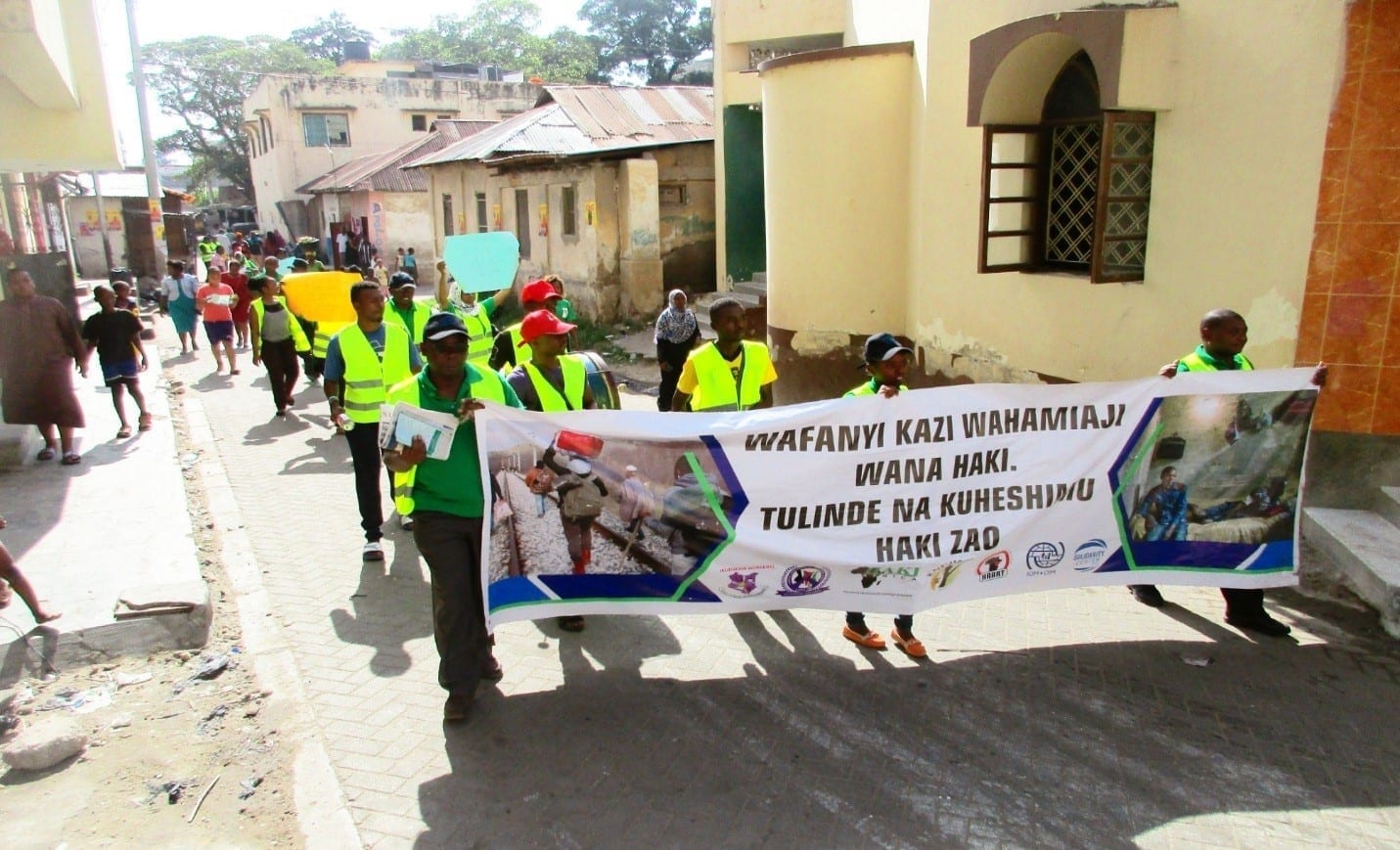
Feb 21, 2019
The Central Organization of Trade Unions-Kenya (COTU-K) and the Kuwait Trade Union Federation (KTUF) signed a cooperative agreement last week in Kuwait City, formalizing the federations’ effort to jointly address issues affecting workers who migrate from Kenya to Kuwait for employment.
“It is crucial to bring together unions from countries on both ends of the migration spectrum to promote a deeper understanding of the challenges workers face along their journey and into the workplace,” said Solidarity Center Director of Middle East and North Africa Programs Hind Cherrouk. “This agreement, which affirms the rights of migrant workers from Kenya in Kuwait, is an important step forward in that regard.”
Millions of migrant workers are trapped in conditions of forced labor and human trafficking around the world, in part as a result of being lied to by labor brokers about the wages and working conditions they should expect. Of the estimated 150 million migrant workers globally, some 67 million labor as domestic workers—83 percent of whom are women—often in isolation and at risk of exploitation and abuse.
The majority of some 34 million Africans are migrants move across borders in search of decent work—jobs that pay a living wage, offer safe working conditions and fair treatment. Often they find employers who seek to exploit them—refusing to pay their wages, forcing them to work long hours for little or no pay, and even physically abusing them. Kenyan women signing on for domestic work in Saudi Arabia, for example, were told they would receive 23,000 Kenya shillings ($221) a month, only to find upon their arrival that the pay was significantly less and the working and living conditions inhumane. Through the Kenya Union of Domestic, Hotel, Educational Institutions, Hospitals and Allied Workers (KUDHEIHA), COTU-K is supporting a multi-year effort to protect domestic workers migrating from the coastal area surrounding the city of Mombasa to homes in the Middle East.
Unions around the globe are increasingly taking joint action to create community and workplace-based safe migration and counter-trafficking strategies that emphasize prevention, protection and the rule of law. KTUF spearheaded a groundbreaking 2015 domestic worker law that granted enforceable legal rights to 660,000 mostly migrant workers from Asia and Africa working in Kuwait as domestic workers, nannies, cooks and drivers, and urged further protection for migrant workers in Kuwait and other Gulf countries. That same year, unions in Asia and the Gulf signed a landmark memorandum of understanding (MOU) that promoted and outlined steps for coordination among unions in organizing and supporting migrant workers in those regions. The Solidarity Center and its partners in the Americas in 2017 crafted a worker rights agenda for inclusion in the United Nations Global Compact on Safe, Regular and Orderly Migration.
“There is a potentially powerful role for union-to-union, cross-national and, in this case, cross-regional solidarity in protecting the dignity of migrant workers traveling from Africa to the Middle East. The Solidarity Center is proud to be a partner in this process and trade union-centered approach between the trade union movements of Kuwait and Kenya,” said Solidarity Center Director of Africa Programs, Hanad Mohamud.
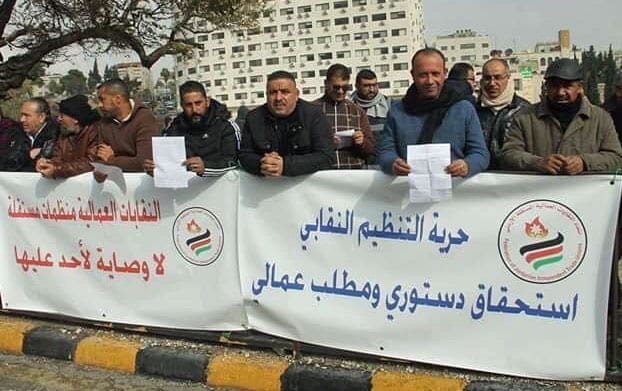
Feb 19, 2019
Jordan’s Senate is set to consider amendments to the country’s labor code that will restrict worker’ fundamental rights to freedom of association and collective bargaining and that fail to address Jordan’s longstanding limitations on worker rights, according to the International Trade Union Confederation (ITUC), which is joined by global unions in condemning the proposal and urging legislators to withdraw it.
The amendments, passed in recent weeks by the country’s House of Representatives, increase restrictions on freedom of association by requiring the Ministry of Labor to approve union bylaws when they register with the government. The amendments also give the Labor Ministry the authority to dissolve unions and impose fines and imprisonment for those who continue union activities for a dissolved union.
(Tell the Jordan government to bring the country’s labor laws in line with international standards.)
Since 1976, no new trade union has been allowed to form in Jordan, which also prohibits migrant workers—who comprise a large portion of the Jordanian workforce—from forming unions. Jordan labor laws also permit unions in only 17 sectors set by the government, and only one union per sector is allowed to represent workers. Most recently, the government rejected the registration of an independent union in the agriculture sector because agriculture is not on the government’s list.
The International Labor Organization (ILO), which also sent Jordan’s minister a memo detailing the amendments’ violations of international labor law, has repeatedly pointed out Jordan’s failure abide by ILO conventions on freedom of association and collective bargaining.
Independent unions in Jordan are also pushing back on the proposed amendments, with workers protesting at parliament and union leaders writing open letters to the government urging lawmakers follow international labor standards.
Read the Jordan Federation of Independent Trade Unions press release and letter (Arabic) and the Jordanian Network for Human Rights letter (Arabic).
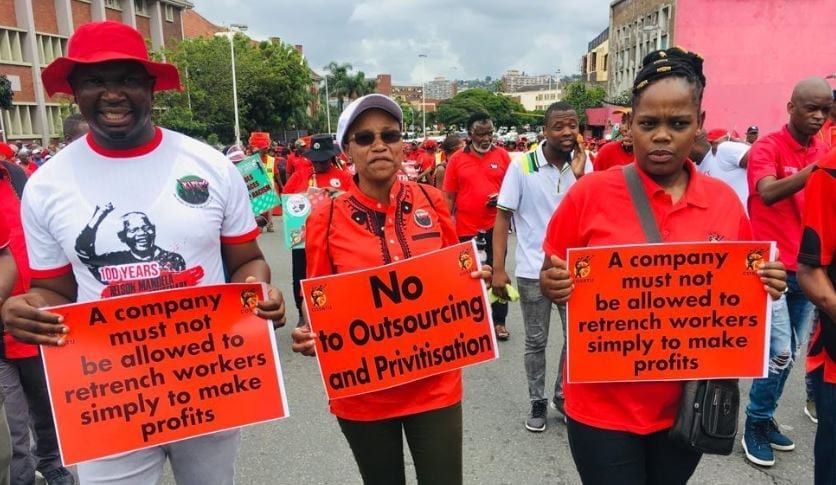
Feb 14, 2019
The Congress of South African Trade Unions (COSATU) launched a general strike across eight provinces Wednesday as a warning to South Africa’s governing party, the African National Congress (ANC), to address rampant job losses and unemployment across the public and private sectors.
“We are tired of economic growth that does not create employment opportunities, that increases inequality, ignores and undermines cultural identities, and that squanders resources needed for future generations,” COSATU said, in a press statement.
Although the country’s official unemployment rate dropped 2 percent in the last quarter of 2018, to 27.1 percent, South Africa’s real employment rate is 38 percent. South Africa has one of the highest unemployment rates among similarly economically developed countries. Some 10 million people are jobless and more than 17 million are on welfare.
Later this month, workers in the Western Cape province will mobilize to pressure Finance Minister Tito Mboweni to include labor’s views on downsizing in the budget speech he will deliver in Cape Town on February 20.
After failing to convince government to declare a moratorium on downsizing workers, COSATU hopes its strike will slow the shedding of more jobs from the health care sector and South Africa’s state-owned enterprises—including energy company ESKOM, where retrenchments last year began without consultation with the National Union of Metalworkers of South Africa (NUMSA).
“[S]ince 2012, government gave the private sector corporate tax breaks,” said COSATU spokesperson Sizwe Pamla in an interview with SABC News. “Now we were saying to them, don’t you think it’s fair… to put a moratorium?”
The strike is supported by all major COSATU-affiliated unions, including the Democratic Nursing Organization of SA (Denosa), the South African Democratic Teachers` Union (SADTU), the South African Municipal Workers` Union (SAMWU), the South African Transport and Allied Workers` Union (SATAWU), the Communication Workers Union (CWU), the Police and Prisons Civil Rights Union (POPCRU) and the South African Commercial, Catering and Allied Workers Union (SACCAWU).
COSATU, with more than 1.5 million members, is a Solidarity Center ally in South Africa. As the strongest voice in civil society, the South African labor movement enables workers to join together for better wages, pro-worker economic policies and increased standards of living.
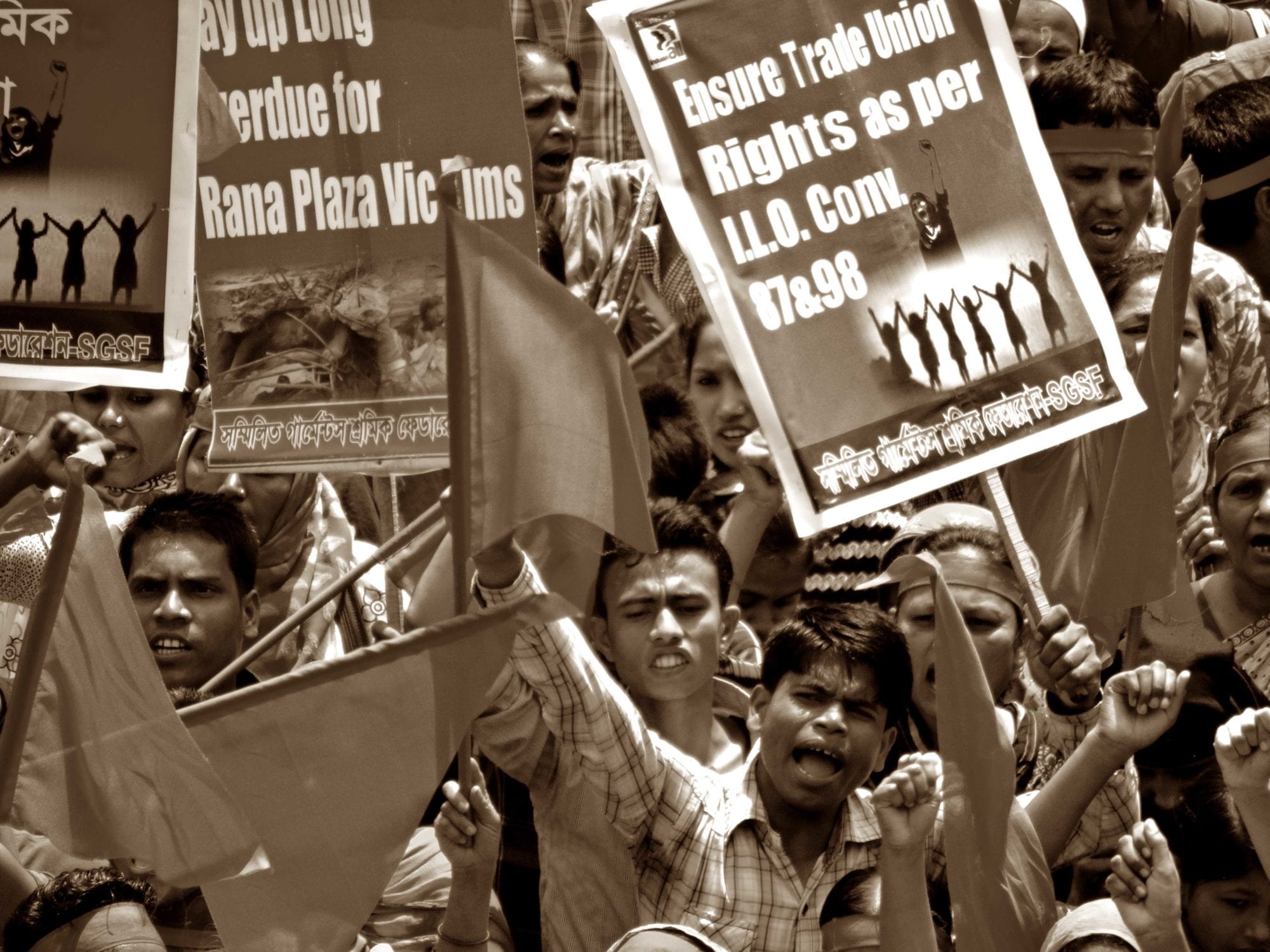
Feb 14, 2019
Tens of thousands of Bangladesh garment workers waged weeks-long strikes in December and January to protest low wages and unequal pay increases—and now workers say factory employers are using the walkouts to further repress their efforts to form unions and collectively bargain better wages and working conditions.
More than 11,000 garment workers have lost their jobs or faced repression as a result of the wage protests, and employers and the police have filed cases against more than 3,000 workers, according to the global union IndustriALL. Many workers fired say they were not involved in the protests.
During the walkouts, police used tear gas, water cannons, batons and rubber bullets, reportedly injuring dozens of workers and killing 22-year-old Sumon Mia, a worker at Anlima Textile in Savar, who was shot dead on his way back to work from lunch.
Billboards with names and photographs of terminated workers have been posted at some factories as an intimidation tactic, and union leaders say factory management is exploiting the walkouts to target and blacklist them from employment in the sector.
Factory walkouts began the second week of December, when mostly nonunion garment workers from roughly 350 factories in Gazipur, Ashulia and Narayanganj protested the elimination of the 5 percent annual wage increase for 2018 and a basic wage increase applied unequally to workers with various skill levels.
Recent Repression of Worker Rights Part of Longer Trend
Following the deaths of more than 1,200 garment workers in the 2012 fire at the Tazreen Fashions factory and the 2013 Rana Plaza building collapse, workers vigorously organized to form unions and negotiate contracts, as the Bangladesh government and ready-made garment (RMG) employers responded to international pressure to improve safety and wages.
But in recent years, employer harassment—including physical attacks and threatening home visits—and government resistance to workers seeking to register unions have meant even fewer workers can join together to collectively improve their workplaces. As recently as November 2018, two union organizers were brutally attacked by men associated with factory management, according to union leaders.
At the same time, Bangladesh’s highest court threatens the expulsion of the Accord on Fire and Building Safety in Bangladesh established after the Rana Plaza disaster. The legally binding agreement between hundreds of primarily European corporate retail brands and unions conducted safety inspections at more than 1,000 factories and educated workers on safety and other workplace rights.
Bangladesh is the biggest producer of garments in the world after China, with apparel exports totaling more than $30 billion last fiscal year. Although the Bangladesh RMG industry is by far the country’s biggest export earner, wages remain the lowest among major garment-manufacturing nations. Yet the cost of living in Dhaka is equivalent to that of Montreal.
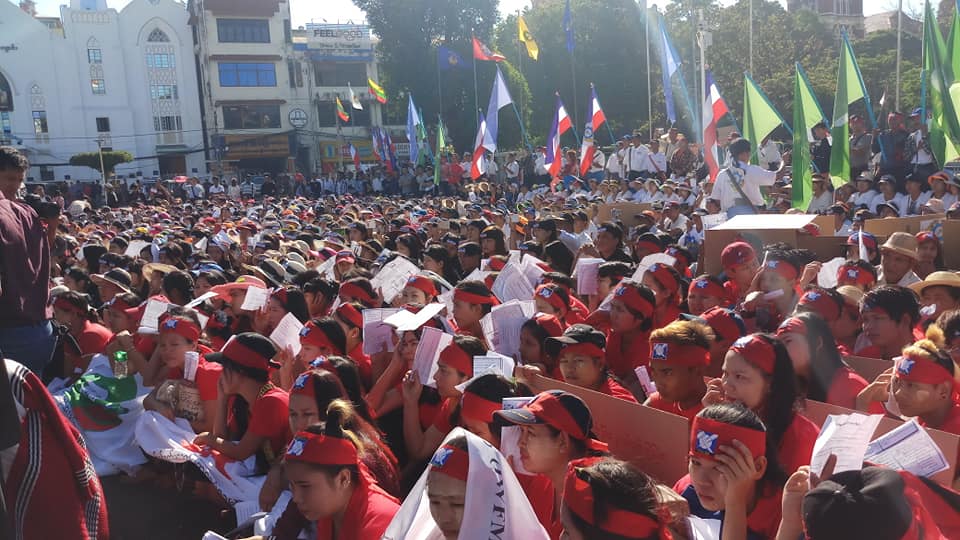
Feb 12, 2019
Thousands of workers marched in downtown Yangon, Myanmar, to demand fair labor laws as parliament appeared poised to pass legislation that would diminish worker rights.
“Respect our right to unionize!” shouted a march leader. “We want it! We want it!” thronged the response from protesters, most of whom toil between 10 and 12 hours a day, six days a week in the industrial zones surrounding Yangon. They are paid a minimum wage of $3.20 a day.
The country’s two largest unions led the march: the Confederation of Trade Unions–Myanmar (CTUM) and the Myanmar Industries, Craft and Services Trade Union Federation (MICS).
The unions pulled out of the official labor law reform process last month to protest two years of what they describe as fruitless talks with the government and employers to bring Myanmar’s labor laws into compliance with international standards.
“We have to get out and march. We can no longer be patient on this matter,” says Daw Phyo Sandar Soe, CTUM assistant general secretary.
Workers have waged dozens of strikes in recent months, protesting that the laws designed to protect them are broken.
New labor laws enacted in 2011 and 2012 gave workers the right to form unions for the first time in 50 years. Further reforms, including adoption of international labor standards, were promised to incentivize Western investors to do business in the country, where human rights abuses, including forced labor and child labor, have been widespread.
Union leaders fear that promises for further reforms will be broken and that the limited freedoms workers were granted earlier this decade will be largely taken away.
“The parliament doesn’t care about labor issues,” says MICS General Secretary U Thet Hnin Aung. If they failed to listen to worker voices, he added, “we will never vote for them in coming elections.”
CTUM President U Maung Maung says “if Myanmar is to catch up with our Asian neighbors and the rest of the world, we need fair labor laws that can bring us stable industrial relations. Otherwise, international investors will be reluctant to come here.”





